“In their fancy prisons, glued to their phones, students are no longer taught to think and act for themselves”
“Let’s face it, the American university as we had known it since World War II lies in ruins.”

This assessment of the current state of higher education is pretty accurate.
From Doc Emet Productions:
After School: The Place of Social Justice at the University
Let’s face it, the American university as we had known it since World War II lies in ruins. The buildings still stand. But the Ivory Tower of the 1950s, ‘60s, ‘70s and ‘80s (when it was indeed possible to get a good liberal arts education there) has been retrofitted. It serves now as Jeremy Bentham’s “panopticon” was famously said to, in Michel Foucault’s landmark reflections on modernity’s array of exquisite psychological tortures, perpetrated by means of constant observation, continuous monitoring and ubiquitous “normalizing” exercises—power scrubbed of all apparent physical violence to more cleanly vivisect the human spirit in the name of totalitarian control. As Foucault writes in Discipline and Punish: “Is it surprising that prisons resemble factories, schools, barracks, hospitals, which all resemble prisons?” (New York: Vintage Books, 1995, p. 228). Were he alive today, what would he say Twitter and other social media resemble?
In their fancy prisons, glued to their phones, students are no longer taught to think and act for themselves, but to internalize prohibitions and behave themselves. They are watching! They are being watched! By teachers, administrators, and above all, each other. Is it any wonder they take it on themselves to monitor their teachers, too, in return? The “genius” of this panoptic surveillance is that it operates in all directions at once.
Courses are still offered. But syllabi that once proudly displayed names like Aristotle, Shakespeare, Walt Whitman, and Sigmund Freud (when it was indeed possible to encounter great authors, ungarnished by some adjunct instructor’s crippling aversion to “stereotypes”) have been hollowed of meaning, as the formerly inspiring experience of being introduced to canonical texts of Western civilization has been replaced by a routine, joyless training in moral hygiene. It’s as if humanities faculty had decided that what their subhuman wards needed was not access to the inheritance of human civilization as their birthright but humanizing and civilizing itself—or to be remade in the image of “Diversity, Equity and Inclusion” administrators, as creatures trained in the manners and mores of Silicon Valley. Say this. Don’t say that. Use these words, not those. Here’s what’s upsetting nowadays (misgendering somebody). Here’s what’s not (grooming children in politically correct attitudes toward sex).
 DONATE
DONATE
Donations tax deductible
to the full extent allowed by law.








Comments
Excellent essay. Worth reading in its entirety.
Not hard to imagine post apocalypse historians looking back on this period of moral hygiene with the same puzzled horror that we view the past practice of douching with Lysol.
More and more, college appears to serve as a gateway to financial slavery to the swamp — get every young adult on the hook for great debt, so that s/he can be controlled as they slowly work it off. Much as the cartels do to “asylum seekers” in the US when they “finance” these people’s journeys.
It’s one thing to be shanghaied into slavery by warlords or traffickers. It’s quite another to enslave yourself by signing a bunch of “routine” forms because you’re just stupid.
I’ve mentioned before that the trajectory of The University seems to echo the trajectory of The Church (Christian, Catholic, in mainly Europe, which calls itself “The Church” still.) There is a Great Doctrine, known before, during, and after, independent of the institution in Christianity. I think also in University.
Tho the institution held sway and did burn plenty of folks when heretic flambe was convenient to the feasters within, that truth continued, and continues. The late Christopher Hitchens’ glorious polemics against religion are more accurately against institutions and religiosity — both literally anathema in many traditions; certainly in Christianity.
I, myself, and not an Evangelical Christian in caricature or as they understand themselves. Yet, the calling to a great truth revealed vs. the encrusting institutions that claim it is obvious to any who will see, and robust, in University also.
The irony is that the more woke one is, the less that they are able to think.
What’s the right equivalent? Because we have some people completely incapable of basic, let alone critical, thinking on our side.